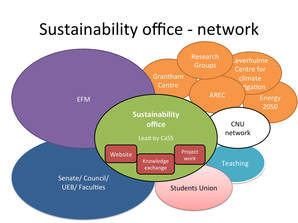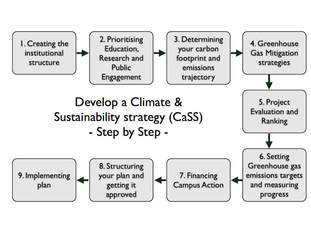A new Task and Finish group has been established to review how environmental sustainability is managed and taken forward. This is what I would like to tell you about today, to provide much needed transparency and allow for people to interact and become change makers for our common good.
Previously, two committees, the Carbon Management Group and the Public Value Subgroup (PVSG), largely oversaw university sustainability. However, this is now changing, as it was recognised that the current structures are not able to achieve the key performance indicators outlined, with one of them being campus carbon emissions. Another (more official) reason given is a restructuring and the establishment of a new ‘Director for City and Regional Engagement’ role, which will possibly oversee sustainability.
You may have heard many rumours, but I was thinking to inform you about the process that is taking place and provide some references that back it up.
Track record of relevant meetings - minutes from UEB
- 10 January 2017: The UEB agreed to recommend the establishment of a Task and Finish group to review how environmental sustainability was managed and taken forward, including the development of an environmental sustainability strategy for the university. It was also stated that the Public Value Sub-Group (PVSG) would be dissolved and while not mentioned in the minutes, this includes dissolving the Carbon Management Group as a subgroup to the PVSG. (Source: Link to UEB meeting minutes)
- 28 March 2017: The last Public Value Sub-Group report was received and approved by the UEB. To our information, it was a report that reviewed some of the sustainability actions around the university and offered some restructuring advice. (Source: Link to UEB meeting minutes)
- 20 June 2017: It was noted that the first meeting of the newly established Task and Finish group will be held shortly and is chaired by Prof Nigel Clarke. It was noted that future activity on sustainability would be managed through the City and Regional Engagement team upon recommendation of the new Task and Finish Group. (Source: Link to UEB meeting minutes)
- 22 June 2017: The first meeting of the Task and Finish group took place, chaired by Prof Nigel Clarke and recommended that two subgroups will be set up. The first, chaired by Steph Holmes will map the current sustainability activity across the University; the other will clearly define the objectives of the group and will be chaired by Professor Duncan Cameron.
It was also noted that a new sustainability fund will be established to complement the current Salix funding available and this proposed fund will be further developed by the Task and Finish group. The next meeting of the Task and Finish group will take place in early September. (Source: meeting minutes of last Carbon Management Group meeting from 6 July)
- 6 July 2017: Last meeting of the Carbon Management Group, of which our network was an official group member and where we were briefed on the developments of the Task and Finish group
Take away information
The Task and Finish group is an essential stepping-stone to develop a new and improved environmental governance structure.
- Steph Holmes (Head of Procurement) and her team will head the effort to map sustainability activity across the university and Prof Duncan Cameron (Prof of Plant and Soil Biology, APS) and his team will define the objectives of the Task and Finish Group.
- The next meeting of the Task and Finish group will take place in early September, and it is vital to reach out to the chair Prof Nigel Clarke (Vice President and Head of Faculty of Science) and the above project leads to support them in their tasks and ensure a sustainability governance structure evolves that takes earlier learning into account.
The work of the university sustainability community, including our network, the Students’ Union and Estates based sustainability staff, have all been suggesting a need for more support and leadership from top management.
We think this support and leadership can be provided by a sustainability governance structure and strategy, and provide a multitude of benefits for all university stakeholders if done well.
To do
- Let’s work together to enable this change and help the Task and Finish Group to deliver a truly transformative sustainability governance structure and strategy.
- Support Nigel Clarke, Steph Holmes and Duncan Cameron in their role
- Link up to the new Students' Union long-term vision (which includes carbon neutrality)
Below is a short outline of a few governance resources we found relevant to the work of the Task and Finish group and on which we can advice on. We also have an overview of governance structures from specific universities in the UK. Get in touch if required.

Together with support from the Grantham Centre for Sustainable Futures, we wrote a Carbon and Sustainability Strategy (CASS) proposal for the University, laying out the reasons for why we need to go carbon neutral, along with benefits and the steps that could be taken initially. With the help of resources from universities on a carbon neutral journey, we concluded that along with a vision we will initially need a team and develop a strategy to get there. In February 2016, this was presented to the two relevant sustainability committees at the time, the Public Value Subgroup and the Carbon Management Group.
- The full CASS proposal for the University of Sheffield is available to download (link).
- It specifically suggests the option of a more centralised sustainability support structure that helps to connect the available sustainability competence and visionaries already existing in house (see figure). The sustainability office would provide support staff to enable the already existing university sustainability players to work together towards a common sustainability goal.

The CASS proposal above includes an analysis of universities aiming to decarbonise and their delivery structures, including references that describe how this can be done.
Most relevant were the resources of the ‘Second Nature’ Higher Education climate change leadership network, which includes more that 600 American universities and colleges. The network and participating universities have put together a number of freely available guide materials to help universities to become sustainability leaders. This includes a step-by-step guide as outlined in the figure below.
- The steps are based on the 2009 Cool Campus! Guide, a 118-page guide on ‘How-to guide for college and university climate action planning’ and the full report can be downloaded (below).
- Again it points to a need for the good governance structure based on a vision of climate leadership
| cool-campus-climate-planning-guide.pdf |
More recently (May 2017), the Environmental Association of Universities and Colleges (EAUC), has published their ‘Next Generation Sustainability Strategy and Structure’ report reviewing how a variety of mostly British higher education institutes arranges their sustainability governance.
- Governance matters: The highest level at which authority of sustainability lies has a significant effect of the impact of the sustainability team. The lower of authority, the lower is the perceived priority of sustainability at an organisation.
- Download report here
Christian
Co-chair,
The Carbon Neutral University (CNU) Network
www.carbonneutraluniversity.org
Our network has been working to introduce an ambitious carbon neutral vision to drive sustainability efforts at the University of Sheffield. Specifically, we would like to see our campus to become carbon neutral by around 2030.

 RSS Feed
RSS Feed